Purs Surname Ancestry ResultsOur indexes 1000-1999 include entries for the spelling 'purs'. In the period you have requested, we have the following 14 records (displaying 1 to 10): Buy all | | | Get all 14 records to view, to save and print for £66.00 |
These sample scans are from the original record. You will get scans of the full pages or articles where the surname you searched for has been found. Your web browser may prevent the sample windows from opening; in this case please change your browser settings to allow pop-up windows from this site. Grantees of royal lands and pardons
(1175-1176)
The Great Rolls of the Pipe are the central record of the crown compiling returns of income and expenditure from the sheriffs and farmers of the various English counties or shires. This is the oldest series of public records, and the earliest surviving instances of many surnames are found in the Pipe Rolls. This is the roll for the 22nd year of the reign of king Henry II, that is, accounting for the year from Michaelmas 1175 to Michaelmas 1176. Most (but not all) of the entries in which names appear relate to payments for grants of land and fines or pardons. The large number of payments of fines for forest transgressions has been interpreted as a form of compounding for pardons by those who had rebelled during the recent years of unrest; or, looking at it in a different way, a form of extortion from the king in order to raise money to pay off the mercenaries with whose help he had quelled the rebellions. There is a separate return in each year for each shire, the name of the shire being here printed at the top of each page. Wales was still independent, in separate kingdoms, at this period, and is not included, except for 'Herefordshire in Wales'. PURS. Cost: £4.00.  | Sample scan, click to enlarge
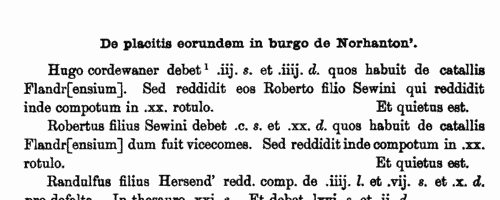
| Liberate Rolls
(1240-1245)
These chancery liberate rolls of the 25th to 29th years of the reign of Henry III of England record the details of payments and allowances as part of the administration of government. Most entries start with the Latin words 'liberate', meaning 'deliver', or 'allocate', meaning allow. There are also 'contrabreves', warrants mainly to sheriffs of shires, assigning them tasks and allowing expenses. Most of the entries relate to England and Wales, but there are occasional references to Ireland and the English possessions in France.PURS. Cost: £4.00.  | Sample scan, click to enlarge

| Patent Rolls
(1275-1276)
Calendars of the patent rolls of the reign of king Edward I are printed in the Calendars of State Papers: but these cover only a fraction of the material on the rolls. From 1881 to 1889 the reports of the Deputy Keeper of the Public Record Office also include calendars of other material from the rolls - about five times as many entries as in the State Papers - predominantly mandates to the royal justices to hold sessions of oyer and terminer to resolve cases arising locally; but also other general business. The calendar for the 4th year of king Edward I [20 November 1275 to 19 November 1276], hitherto unindexed, is covered here.PURS. Cost: £6.00.  | Sample scan, click to enlarge
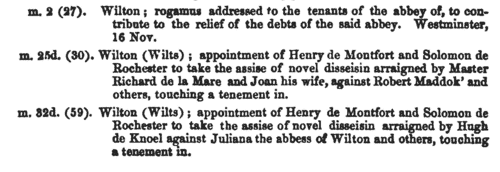
| Patent Rolls: entries for Wiltshire
(1275-1276)
Calendars of the patent rolls of the reign of king Edward I are printed in the Calendars of State Papers: but these cover only a fraction of the material on the rolls. From 1881 to 1889 the reports of the Deputy Keeper of the Public Record Office also include calendars of other material from the rolls - about five times as many entries as in the State Papers - predominantly mandates to the royal justices to hold sessions of oyer and terminer to resolve cases arising locally; but also other general business. The calendar for the 4th year of king Edward I [20 November 1275 to 19 November 1276], hitherto unindexed, is covered here.PURS. Cost: £6.00.  | Sample scan, click to enlarge
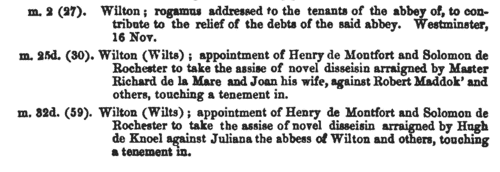
| Worcestershire Inhabitants
(1280)
The Worcestershire Lay Subsidy roll of about 1280 lists lay inhabitants of each township of the shire and of each ward of the city of Worcester, with the amount of tax payable by each. Latin.PURS. Cost: £4.00.  | Sample scan, click to enlarge
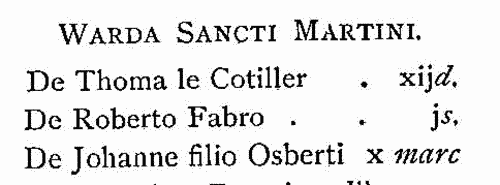
| Taxpayers of Swanborough hundred in Sussex
(1296)
This roll of a tax of an eleventh assessed on the inhabitants of the rape of Lewes in Sussex was delivered to the Treasury in May 1296: the roll, remaining among the Carlton Ride Manuscripts (E. B. 1781) was edited and annotated by W. H. Blauuw, and published by the Sussex Archaeological Society in 1849. The hundred of Swanborough comprised the parishes of Iford, Kingston, Westout, and Southover, near Lewes: but this short list of jurati or assessors does not indicate which places they each represented.PURS. Cost: £6.00.  | Sample scan, click to enlarge
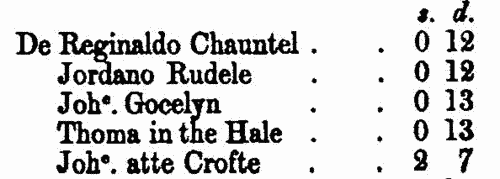
| Grantees of offices, commissions and pardons
(1317-1321)
The Patent Rolls are the Chancery enrolments of royal letters patent. Those for the 11th to the 14th years of the reign of king Edward II (8 July 1317 to 7 July 1321) were edited for the Public Record Office by G. F. Handcock, and published in 1903. The main contents are royal commissions and grants; ratifications of ecclesiastical estates; writs of aid to royal servants and purveyors; and pardons. Most extensive are the commissions of oyer and terminer to justices to investigate complaints about specific crimes and wrongs in particular counties.PURS. Cost: £2.00.  | Sample scan, click to enlarge

| Inhabitants of Leicester
(1103-1327)
The Corporation of Leicester commissioned the publication (in 1899) of extracts from the earliest borough archives, edited by Mary Bateson. This volume brings together several important sources: the borough charters; the merchant gild rolls (from 1196 onwards); tax returns; court rolls (from about 1260 onwards); mayoral accounts, &c. All the Latin and French texts are accompanied by English translations. Membership of the merchant gild was by right of inheritance (s. p. = sede patris, in his father's seat), or by payment of a fee called a 'bull' (taurus). The sample scan shows part of a gild entrance roll; those marked * paid their bull, and were thus, by implication, not natives, or at least not belonging to gild merchant families. By 1400 membership of the gild merchant had become the equivalent of gaining freedom of the borough (being a free burgess): but at this period the two were not necessarily the same, and some of the merchant gild members were not resident in the borough, merely traded there. Not all the tax rolls surviving for this period are printed: but full lists of names are given for a loan for redemption of pontage and gavelpence of 1252-3 (pp. 44-46); five tallages of 1269 to 1271 brought together in a single table (128-145); and tallages of 1286 (208-211), 1307 (255-257), 1311 (272-274) and 1318 (310-313). The portmanmoot (or portmote) was the borough court dealing with minor infractions and civil suits. Finally, there is a calendar of charters (from c.1232 onwards, 381-400), and a list of mayors, bailiffs (reeves), receivers and serjeants (401-407).
PURS. Cost: £4.00.  | Sample scan, click to enlarge

| Clerks and Clergy in Herefordshire, Shropshire, Gloucestershire and Devon
(1370-1375)
The register of bishop William de Courtenay of Hereford, containing general diocesan business, but also including ordination lists for monks and clergy. Only a small proportion of the clerks went on to acquire benefices and remained celibate. Hereford diocese covered almost all Herefordshire, southern rural Shropshire, a westward arm of Worcestershire, and a northwestern slice of Gloucestershire. The ordinations for the first two years, 1370 and 1371, took place while the bishop was still resident in Devon, and contain mainly Devon men.PURS. Cost: £6.00.  | Sample scan, click to enlarge
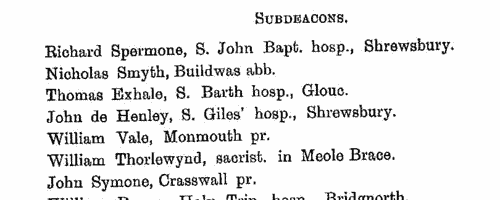
| Suffolk Poll Tax Returns: Mildenhall
(1381)
Edgar Powell transcribed and edited the poll tax returns for Thingo and Lackford hundreds (Public Record Office Lay Subsidy Suffolk 180/34, 38, 43, 49 and 52) for his study of the peasants' rising of 1381. Full lists of adults are given, township by township, under the heads armiger (esquire, rated at 6s), agricole (farmers, 3s a head), artifices (craftsmen, at 2s, often with their trade specified), laboratores (labourers, 12d), and servientes (servants, 4d to 12d a head, sometimes with their master's name given). The Mildenhall return has separate lists for brasiatores (brewers) and pannarii (clothiers). PURS. Cost: £4.00.  | Sample scan, click to enlarge

|
| 1 | 2 |  |
Research your ancestry, family history, genealogy and one-name study by direct access to original records and archives indexed by surname.
|












